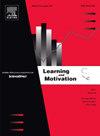EFL students’ motivation predicted by their self-efficacy and resilience in artificial intelligence (AI)-based context: From a self-determination theory perspective
IF 1.7
4区 心理学
Q3 PSYCHOLOGY, BIOLOGICAL
引用次数: 0
Abstract
As Artificial Intelligence (AI) technology becomes more integrated across various areas, institutes of higher education implement different AI tools to modernize their teaching methods. Incorporating AI into teaching has revolutionized conventional learning settings, providing innovative resources to boost student motivation and success. Motivation is a critical factor influencing English as a foreign language (EFL) learners’ success in AI-based settings. However, understanding how psychological elements like self-efficacy and resilience impact motivation in these contexts remains a growing area of educational interest. Directed by Self-determination theory (SDT), which underlines the importance of autonomy, relatedness, and competence, the present research aims to reveal the intricate dynamics between EFL learners’ self-efficacy, resilience, and learning motivation. To this aim, data were collected from 472 EFL students in four Chinese universities including a range of academic majors including computer science, ecology, history, and business with most participants being freshmen and sophomores. Structural equation modeling (SEM) was used to evaluate the measurement model and multiple regression analyses investigated the predictive effects of self-efficacy and resilience on EFL learners’ motivation. Indeed, the results indicated that resilience and self-efficacy were both significant predictors of motivation, jointly explaining 54.2 % of its variance. Nonetheless, resilience was a strong predictor, uniquely explaining 24.71 % of its variance against self-efficacy’s 14.75 %. The findings highlight SDT’s relevance in explaining how psychological factors influence motivation in AI-based settings. Moreover, the results underscore the relativeness of SDT’s fundamental concepts in describing how psychological elements affect learning motivation in AI-based settings. The present research offers precious knowledge for teachers, policymakers, and scholars aiming to optimize AI tools in teaching. Practical recommendations include targeted strategies to enhance learners’ self-efficacy and resilience, thereby fostering motivation. These results contribute to a broader understanding of SDT’s application in AI-assisted education, offering a foundation for future investigations into motivational mechanisms in such environments.
基于人工智能的英语学生自我效能感和心理弹性对动机的预测:基于自我决定理论的视角
随着人工智能(AI)技术在各个领域的整合程度越来越高,高等教育机构实施了不同的人工智能工具来实现教学方法的现代化。将人工智能融入教学已经彻底改变了传统的学习环境,提供了创新的资源来提高学生的积极性和成功。在人工智能环境下,动机是影响外语学习者成功的关键因素。然而,了解自我效能感和弹性等心理因素如何在这些背景下影响动机,仍然是教育兴趣的一个日益增长的领域。在自我决定理论(SDT)的指导下,本研究旨在揭示英语学习者自我效能感、弹性和学习动机之间复杂的动态关系。为此,我们收集了来自中国四所大学的472名英语学生的数据,包括计算机科学、生态学、历史和商业等一系列学术专业,大多数参与者是大一和大二的学生。采用结构方程模型(SEM)对测量模型进行评价,并通过多元回归分析考察了自我效能感和心理弹性对英语学习者动机的预测作用。事实上,结果表明,弹性和自我效能都是动机的显著预测因子,共同解释其方差的54.2% %。尽管如此,弹性是一个强有力的预测因子,它独特地解释了24.71% %的方差与自我效能的14.75% %的方差。研究结果强调了SDT在解释心理因素如何影响基于人工智能的环境中的动机方面的相关性。此外,研究结果强调了SDT基本概念在描述心理因素如何影响基于人工智能的学习动机方面的相关性。本研究为旨在优化教学中的人工智能工具的教师、政策制定者和学者提供了宝贵的知识。实用的建议包括有针对性的策略,以提高学习者的自我效能感和弹性,从而培养动机。这些结果有助于更广泛地理解SDT在人工智能辅助教育中的应用,为未来研究此类环境中的激励机制奠定基础。
本文章由计算机程序翻译,如有差异,请以英文原文为准。
求助全文
约1分钟内获得全文
求助全文
来源期刊

Learning and Motivation
Multiple-
CiteScore
2.90
自引率
0.00%
发文量
53
期刊介绍:
Learning and Motivation features original experimental research devoted to the analysis of basic phenomena and mechanisms of learning, memory, and motivation. These studies, involving either animal or human subjects, examine behavioral, biological, and evolutionary influences on the learning and motivation processes, and often report on an integrated series of experiments that advance knowledge in this field. Theoretical papers and shorter reports are also considered.
 求助内容:
求助内容: 应助结果提醒方式:
应助结果提醒方式:


